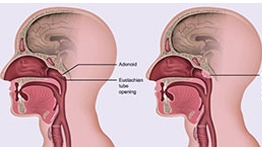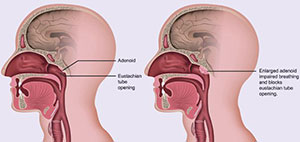Adenoidectomy


The most serious problem is bleeding, which may need a second operation to stop it. However, bleeding after adenoidectomy is very uncommon. Usually we have seen bleeding happen in one in 200 operations. It is very important to let us know well before the operation if anyone in the family has a bleeding problem.
During the operation, there is a very small chance that their tooth might be chipped or knocked out, especially if it is loose, capped or crowned. Please let us know if your child has any teeth like this.
Some children feel sick after the operation. It happens due to the anaesthesia medicines and it settles quickly
A small number of children find that their voice sounds different after the surgery. It may sound like they are talking through their nose a little. This usually settles by itself within a few weeks.
The child’s nose may seem blocked up after the surgery, but it will clear by itself in a week or so.
Sore throat and ears
Your child’s throat may be a little sore after the operation. Prepare normal food. It is better to give them cold and soft food for one week after the surgery. Eating food will help your child’s throat to heal. Chewing gum may also help the pain.
Your child may have sore ears. This is normal. It happens because your throat and ears have the same nerves. It does not mean that your child has an ear infection.
Give painkillers as needed for the first few days. Do not use more than it says on the label. Do not give your child aspirin - it could make your child bleed. (Aspirin is not safe to give to children under the age of 16 years at any time, unless prescribed by a doctor).
Bleeding can be serious
If you see severe bleeding from your child’s throat or nose, you must see a doctor. Either call the clinic number or go to the emergency of the hospital or to your nearest hospital emergency.
What are the adenoids?
Adenoids are lymphoid tissue like tonsils but sit, at the back of the nose. They help in clearing infections by fighting against germs in younger children. We believe that after the age of about two years, the adenoids are no longer needed. Your body can still fight the germs without your adenoids as other parts of the body will pick up the function.

Why take them out?
Sometimes children have adenoids so big that they block the nose completely and interfere with their breathing, so they have to breathe through their mouths. This makes snoring at night. Some children even stop breathing for a few seconds while they are asleep. This may reduce the oxygen supply into their bodies and thus is detrimental to health. This may make long term heart and lung problems for patients.
Some children may suffer from recurrent colds and runny nose which does not settle down even with recurrent use of antibiotics and long term use of allergy medicines. Antibiotics are not helpful and only produce temporary relief from infected nasal discharge. They have side effects and may promote ‘super-bugs’ that are resistant to antibiotics.
The adenoids can also cause ear problems by blocking the tube which connects your nose and your ear, from working properly. This can make fluid collect behind the drum. This can cause hearing problem or recurrent ear pain or ear infections.
If you or your child is suffering from any of the above we might advise you to take the adenoids out to help you out.
What are the alternatives available?
Your adenoids might get smaller as you grow older, so you may find that nose and ear problems get better with time.
For some children, using a steroid nasal spray will help reduce congestion in the nose and adenoids, and may be helpful to try before deciding on surgery.
Surgery will make these problems get better more quickly, but it has a small risk. You should discuss with your surgeon whether to wait and see, or have surgery now. You may change your mind about the operation at any time, and signing a consent form does not mean that your child has to have the operation.
If you would like to have a second opinion about the treatment, you can ask your specialist. He or she will not mind arranging this for you.
Other operations
If we are taking adenoids out because of ear problems, we may put in grommets at the same time. If your child has sore throats or stops breathing at night, we may also take their tonsils out at the same time. We will tell you what these operations involve if we are going to do them.
Before the operation
Arrange for a week off from school after the operation. Let us know if your child has a sore throat or a cold in the week before their operation - it may be safer to put it off for a few weeks.
How is the operation done?
Your child will be in deep sleep for the operation. We will take out the adenoids through his or her mouth by a special instrument called “COBLATION”. This device uses plasma energy to eat the adenoids and at the same time prevent it from recurrence. Since it uses energy at 40-50 degree Centigrade it is gentler to the tissues and creates fewer side effects after surgery including pain and bleeding. After removing the adenoids up to its base we will then stop the bleeding before he or she is woken up. Thus there are no cuts or sutures on the neck. The operation takes about 20 minutes or so. But you may be in the recovery room for another half an hour or so.
How long will my child be in hospital?

Mostly adenoid surgery is done as a day case, so that the child can go home on the same day as the operation. Sometimes we may prefer to keep children in hospital for one night especially if they were suffering from snoring and breathing difficulty before the operation so that we can keep them under observation for the first night. Either way, we will only let him or her go home when he or she is eating and drinking and feels well enough.
Most children need about a week off nursery or school. They should rest at home away from crowds and smoky places. Stay away from people with coughs and colds as they are very liable to pick infections quickly at this time.
Possible complications
Adenoid surgery is very safe, but every operation has small risks.



